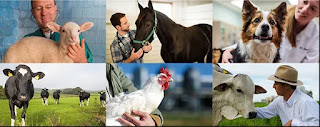Animal health is an umbrella term that encompasses animal health from conception to death. Proper animal health starts with proper animal upbringing, which includes providing clean and nutritious food and water, adequate shelter, and good biosecurity. Proper animal health also includes disease prevention and treatment, as well as population management to ensure the long-term viability of the animal production system.
Methods for ensuring livestock health.
When raising livestock, animal health is an important consideration. The health of the animals you raise is critical to their and your success. Some of the most important ways to ensure the health of your livestock are as follows:
- Regularly inspecting the animals' health. Looking for signs of illness, injury, or disease is part of this.
- Vaccinating animals for common diseases.
- Feeding a balanced diet that is tailored to the needs of the animal
- Providing plenty of clean water and adequate shelter
- Ensure that the animals are handled and treated properly during transport, slaughter, and processing.
The value of animal health in the food industry
The food industry places a high value on animal health. Proper animal health can increase output while decreasing disease incidence. Disease can cause significant economic and animal welfare losses.
The food industry has recently placed a greater emphasis on animal health. This is because good animal health can lead to high-quality animal products, which can boost consumer satisfaction and food demand.
There are numerous factors that can have an impact on animal health, both internally and externally. Genetics, diet, environment, infections, parasites, and injuries are all examples of risk factors. Each of these factors can affect an animal's health and well-being and can be addressed to improve their health.
There are numerous methods for improving animal health.
Improving animal health can lead to higher output, lower animal costs, and better animal welfare. Improving feed quality is one way to improve animal health. Increase the number of nutrients and vitamins in the feed, add supplements, or change the feed composition to improve feed quality. Reduce the number of contaminants in the feed to improve feed quality.
Improving animal nutrition is another way to improve animal health. Increase the number of nutrients and vitamins in the feed, add supplements, or change the feed composition to improve animal nutrition.
Improving the environment in which the animals are raised is one way to improve animal welfare. The environment can be improved by reducing the number of pollutants in the air, water, and soil, improving shelter quality, and increasing farm biosecurity.
Animal welfare in research.
Because of the close relationship between animal and human health, animal health is a major topic of research and concern. Animal-human health interactions are thought to account for roughly one-third of all human disease. Animal health is an important aspect of food safety and public health.
Animal health is a broad subject that includes animal biology, animal behavior, veterinary medicine, food safety, and public health. It is also a rapidly expanding field due to the increasing number of animals and their interactions with humans. Animal health researchers are constantly developing new methods and technologies to maintain and improve the health of animals and humans.
One of the primary goals of animal health research is to create methods for preventing and treating animal diseases. Animal diseases can be financially and psychologically devastating to both the animals and the people who raise them.
The subject of animal health is complicated.
Animal health is a complicated subject with no single answer to every question. Every animal is unique, as are all situations. This means that no single approach is always the best solution. It is critical to work with a veterinarian who is familiar with your specific situation and your animals in order to receive the most effective animal health care possible.
When it comes to animal health, there are a few key points to remember. First and foremost, always ensure that your animals are receiving the best possible food and water. Second, be on the lookout for any changes in behavior or appearance. If you notice any unusual symptoms, take your animals to the vet as soon as possible.
Finally, be ready to answer any questions that your veterinarian may have. You can help ensure that your animals receive the best possible care by becoming familiar with animal health.





